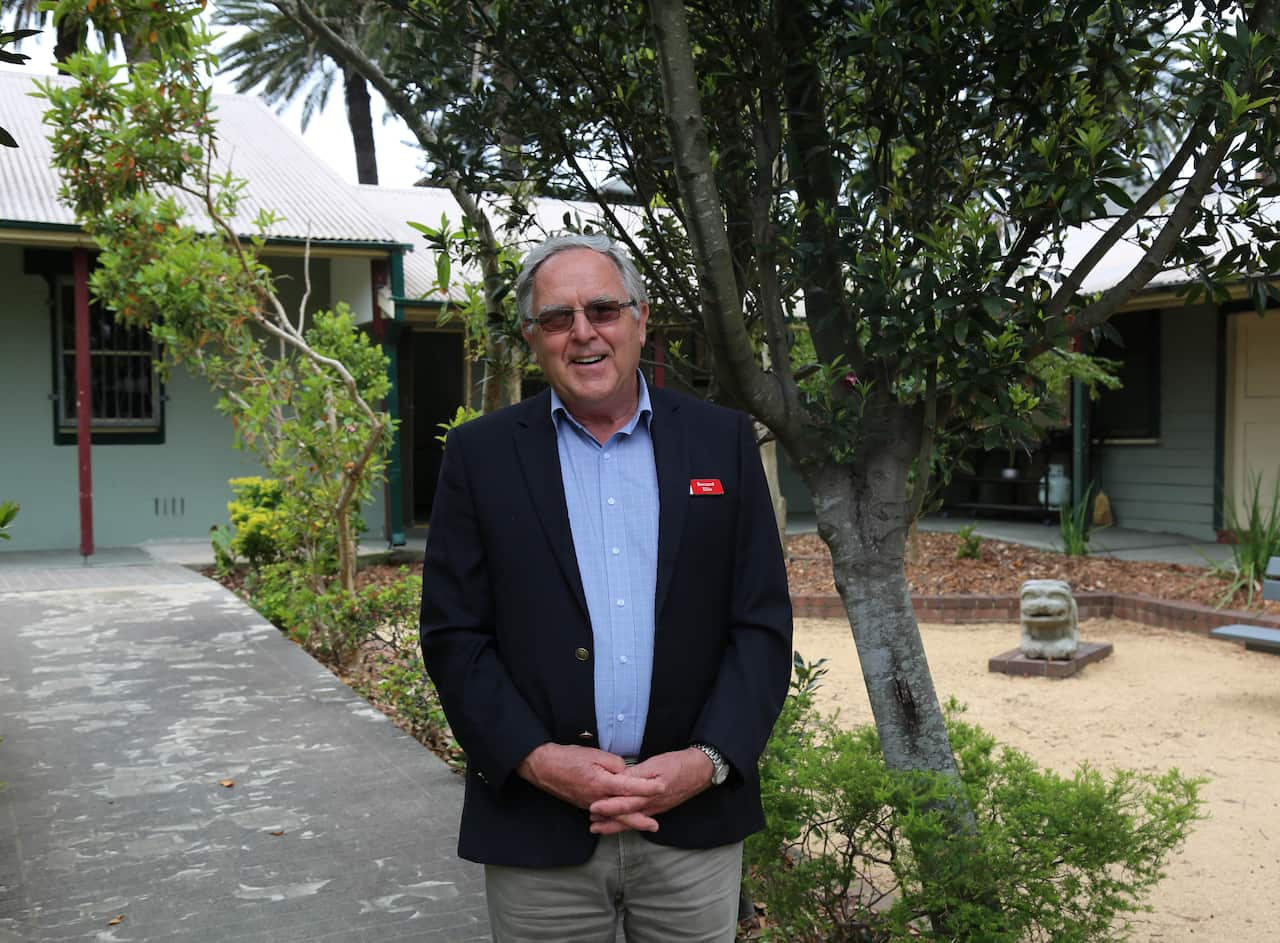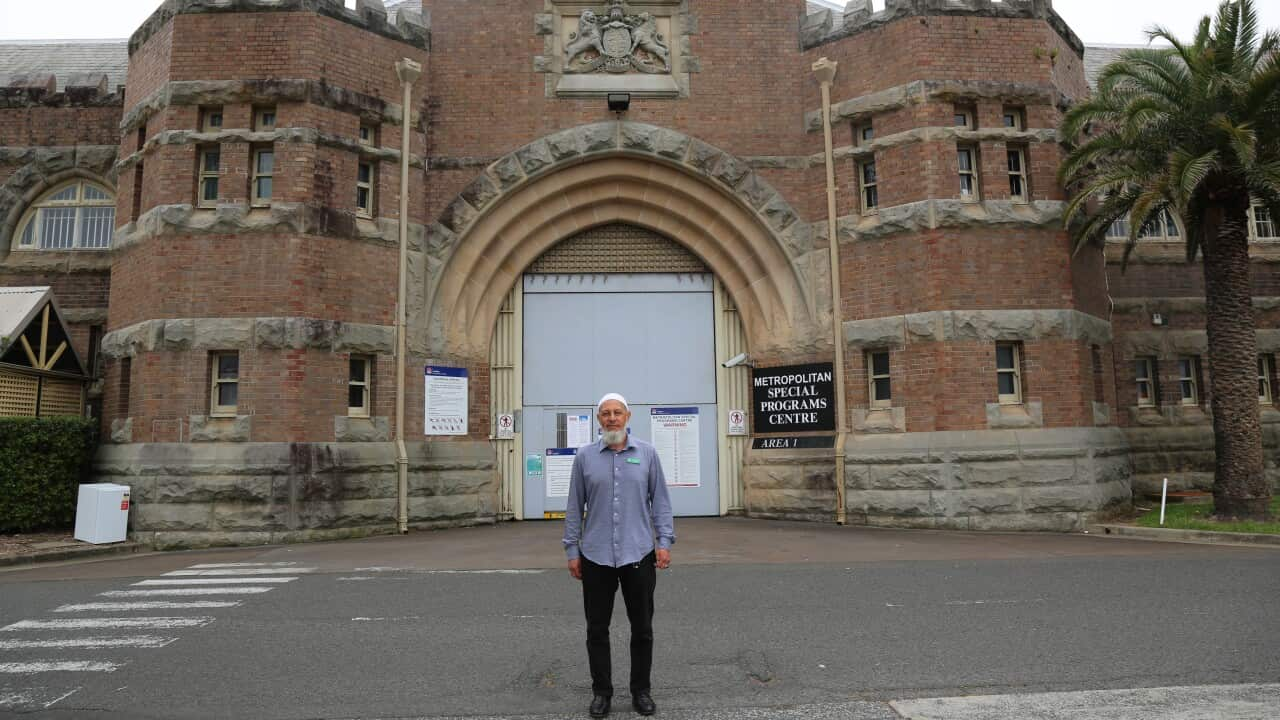From his office in the grounds of Long Bay Correctional Complex in Sydney, Islamic prison chaplain Ahmed Kilani loads a transparent tote bag with books.
‘Fortress of a Muslim’ and a black and gold bound copy of Islam's holy book the Quran sit at the top of the pile as he slings his toolkit over his shoulder.
“You’re seeing people when they are very vulnerable,” Mr Kilani tells SBS News.
“You might come into work and there’s a referral to see someone who has had a suicide attempt the day before or someone that’s come into custody who is not coping well.
“Someone with a heavy sentence or someone who is looking at their offences and coming to a bit of self-grief about things.”  Mr Kilani has been a chaplain in the New South Wales correctional system for more than five years, providing pastoral care to prisoners across the state. But since the coronavirus pandemic hit, he has been one of only a few allowed beyond the prison walls, clad in personal protective equipment and practising social distancing.
Mr Kilani has been a chaplain in the New South Wales correctional system for more than five years, providing pastoral care to prisoners across the state. But since the coronavirus pandemic hit, he has been one of only a few allowed beyond the prison walls, clad in personal protective equipment and practising social distancing.

Ahmed Kilani in his office at Long Bay Correctional Centre. Source: CSNSW
“The inmates were very stressed out at the beginning because of the reports from overseas of COVID entering the jails and becoming almost like the cruise ship scenario,” Mr Kilani says.
“They’re also more cut off from their families with the [pausing of] physical visits so sometimes they came to chaplaincy to assist with that.”
In March, visiting restrictions were introduced across the prison system to allay fears of a COVID-19 outbreak among inmates. Prior to that, there were about 4,500 face-to-face visits a week across NSW correctional facilities alone.
Tens of thousands of video visits between inmates and their families have since been facilitated, and in-person visits are temporarily suspended again in NSW due to the recent COVID-19 outbreak.
Mr Kilani says a connection to faith can help provide guidance in times of isolation and uncertainty.
“When people come into custody, they have a lot of time to reflect … imagine locking yourself in your bathroom from 3pm and staying in there until 7am the next morning; you’ve got a lot of time to yourself.”
“A lot of people use that time to look at their lives and want to make a change … religion is very good at giving people discipline, learning about the consequences of behaviour.”
A lot of people use that time to look at their lives and want to make a change … religion is very good at giving people discipline. - Ahmed Kilani, Prison chaplain
He also says it can also be a powerful tool to help with rehabilitation.
“People tend to forget, anyone can come into custody, people make mistakes in life, but we don’t judge them for the rest of their lives based on that mistake."
Isolation and rehabilitation
Prison chaplains follow various faiths and some say they've never been as important.
Catholic chaplain Bernard Ellis says the increased isolation and uncertainty for prisoners that came as a result of COVID-19 this year can affect rehabilitation.
“That’s one of the things we’re learning from COVID, that people are under duress and what gets impacted is their mental health,” he says.
“We do need that sense of spirituality, that gives us purpose and meaning in life. If we understand that, it seems to be, we can cope [better] when things go bad.”  Mr Ellis was a science and religion teacher for 40 years before he decided to seek a career change.
Mr Ellis was a science and religion teacher for 40 years before he decided to seek a career change.

Bernard Ellis says prison chaplaincy gave him a new outlook on the prison system. Source: CSNSW
“I’ve got to blame my mum … she told me as I was approaching 60 that I needed to reinvent myself,” he says.
“I had no idea what a prison was. What I did know was that I didn’t like it and didn’t want to go anywhere near it. But as I made enquiries, I found it struck a chord with me, I wanted to know more.”
He now works at Emu Plains Correctional Centre, a minimum-security prison for women just outside of Sydney.
“When someone is in a difficult situation or a crisis, they have to be given hope, a way forward or a way out.
“All religions have their rules, their commandments, they give people an anchoring point as to a moral compass.”
Historic roots
Prison chaplaincy has a long history in Australia. According to theology researcher and former Buddhist prison chaplain Sunim Bomhyon, it spans back to the First Fleet.
“There were ministers of the Church of England and they were involved in offering chaplaincy,” she says. “Often that chaplaincy was more about behavioural management rather than actually a caring of in the way we think of pastoral care and chaplaincy these days.
“They weren’t highly appreciated by the prisoners because of their role … they were under the direction of the governor of the time.”  Venerable Bomhyon believes chaplaincy can help prisoners heal and inspire self-growth whether they are of faith or not.
Venerable Bomhyon believes chaplaincy can help prisoners heal and inspire self-growth whether they are of faith or not.

Venerable Sunim Bomhyon is currently researching religion in Australia at Western Sydney University. Source: Jennifer Scherer/SBS News
She says the practice is about "spirituality", the connection with the inner-self rather than a space for religious ministry.
'Religion saved me'
Former inmate Youseff* spent more than three years in jail after a stabbing offence.
“When I was 15 or 16 years old, I started to get into trouble, drugs, hanging around with the wrong crowd,” he says.
“I started going into detention centres, rehab but never with an intention of changing.
“I was always a person who believed in God, but I misbehaved at the same time … I’d get out and do the same thing again.”  Despite growing up in a Catholic household, Youseff was drawn to Islam while in prison after a conversation with a fellow inmate.
Despite growing up in a Catholic household, Youseff was drawn to Islam while in prison after a conversation with a fellow inmate.

Youseff* converted to Islam while in prison. Source: SBS News
“I was on the way to court and I met someone who was a Muslim and he had a green towel with him. I said to him, 'what’s the towel for?'
“I got speaking with him and we started talking about religion, I had a lot of questions, I was very curious about the way he was so devoted.”
The inmate gave Youseff a small book to read, ‘A Brief Illustrated Guide to Understanding Islam’.
“He wasn’t like a lot of the other people I had seen, he was different, very humble and didn’t have that jail mentality,” Youseff says.
“A lot of people in jail, there’s a lot of pride, and if someone says something wrong or disrespects them, then they are straight up off the chair and there’s a lot of trouble. His manners were very different.”
“After reading that book, that’s what attracted me ... A couple of days later, we had Friday prayers in the jail and that’s when I became Muslim, I said the testimony of faith.”
Youseff says Islam helped him turn his life around. He has now finished his parole, is married and welcomed a child this year.
“I definitely wouldn't have changed as a person if it wasn't for Islam, if I didn't have those principals, those rules, that guidance,” he says.
“The brothers encourage other brothers to pray, remind each other why we are in jail and look at what we’ve done to the community, to our parents.
“My parents, they came and visited me every week, no matter where I was - so that made me realise I put them through hell.”
“The first thing I did when I left jail, I didn’t come home.
“My father and mother picked me up from the jail and I asked, 'please take me to the mosque'.”
*Name has been changed
Readers seeking support with mental health can contact Beyond Blue on 1300 22 4636. More information is available at . supports people from culturally and linguistically diverse backgrounds.
***
People in Australia must stay at least 1.5 metres away from others. Check your jurisdiction's restrictions on gathering limits. If you are experiencing cold or flu symptoms, stay home and arrange a test by calling your doctor or contact the Coronavirus Health Information Hotline on 1800 020 080.
Please check the relevant guidelines for your state or territory: , , , , , , , .




